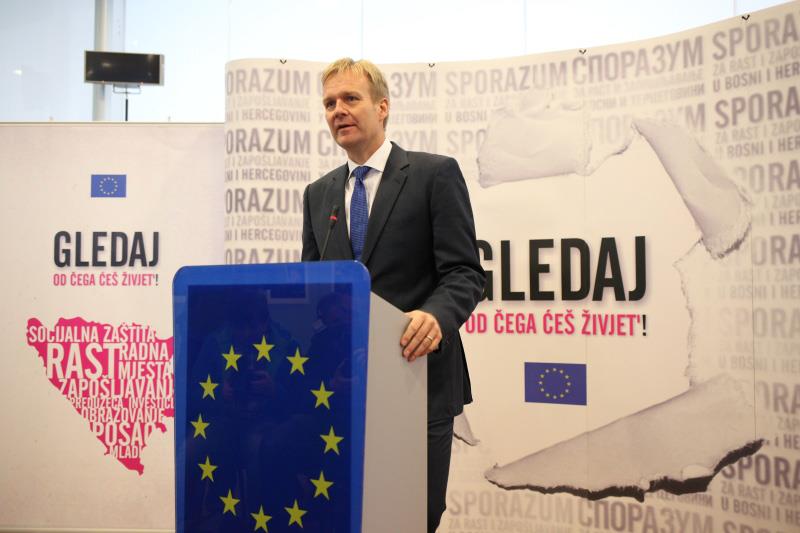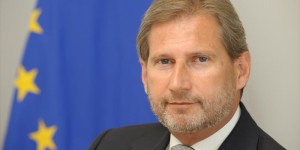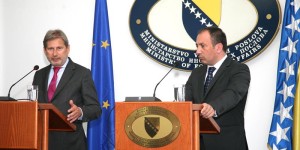Ambassador Sorensen: Thanks to all of you, thanks for coming. This will be my last press conference in this capacity. And actually I was torn between throwing you a party and giving you a press conference because the main purpose of today is to thank you very much for the cooperation we’ve had through the last three years.
Actually, when I arrived one of the key things was to see how to make a partnership with you. Because your work in what we are trying to do in this building is absolutely essential. The work of the media spreading the news, asking the questions, making sure that public opinion is formed and informed, is absolutely essential. So in doing that it was very key, for me personally, to have a relationship with you and I have to say that you have been second to none in the way you handled this: you’ve never tricked me, I’ve never tricked you, but I’ve promised you that from day one. But you have also been a good partner in trying to spread the message as we would like to have it out there.
Together with the institutions, the political parties, civil society, the social partners and so on, you’ve all played a very important role in what we are doing. And I want to say, as my last statement, Bosnia and Herzegovina is a European country. It is a country that belongs inside the EU, it is a country that belongs together with us. To get there, there are a number of things that need to be worked on and that’s what we’ve been working on for the past three years. There are some political criteria, which include things like Sejdic-Finci and other things. There are some economic criteria which are addressed through the things which you see behind my back today.
This is what I’ve been working on for the past three years but with me, that’s another big thank that I want to send out today, there have been enormously dedicated and competent staff that you have in this building. We are one of the largest Delegations that the EU has. I can ensure you that’s the case but I can also ensure you that it’s one of the best, if not the best in its operation. You’ve seen that – when we’ve expressed our solidarity when the floods hit. You have never ever before seen the European Union come out with that speed and with that effectiveness, as we have done there. It is simply unsurpassed. And for that I thank this staff who have been working tirelessly, who have accepted my methodology of working which is basically every day, all the time, throughout the night. Ask them when they’ve got the SMSs and the e-mails! But, they have taken it in good spirit because they had one thing and one thing only at heart and that is that this country joins the EU as fast as it can. So, thank you very much to them.
Over the past three years we have grown to know you better and you have grown to know us better. When I arrived I was a bit surprised how little information was out there. What we were actually doing – we had to do a lot of explanation. But you have helped with explaining that. Thank you for that.
But now there is a big task still ahead. We stand ready to help with that. Just before the elections I wanted to understand how the population looked at this and it is very clear there is a gap between what the population expects and what is delivered to them. 87% of the population of the electoral body does not feel that the issues that are important to them are reflected in the activities that happen politically in this country. That is not good. That is a disconnect that needs to be amended. 78% of the same electoral body do not think that the activities for the economy are where they should be. That is not good because that is a disconnect that needs to be amended. And these, of course, are the tasks that I leave my successor to work with. But more importantly, that is there to be worked on by the government that is coming in place now.
It is a good time for me to say goodbye because someone else will come in my place. That someone else will be working with a new government that works with a new mandate that will have the same task ahead of them. But tasks that are easier to handle because now – compared to three years ago – you know what needs to be done, we know what to expect of you, we know where we can be of assistance and that is what we are there to do.
So, once again – thank you for coming today. I did not expect to see so many of you. Thank you very much for coming, keep up the good work and please receive my successor with the same fairness as you received me. Please, establish the same good relationship with that person as you established it with me. Good luck and see you soon inside the European Union.
TV1: Ambassador Sorensen, do you know who your successor is? Jelko Kacin was mentioned as such and in relation to it the disapproval of RS President, Milorad Dodik. In that context, I would like you to answer how much will anyone in BiH have a say who will be the successor?
Ambassador Sorensen: I do not who it is going to be, I do not know when it is going to be and the replacement of the EU Special Representative and the Head of Delegation follows the normal diplomatic procedures. So, that is how it is.
BiH Radio: You have been here for three years. Are you leaving being disappointed and do you consider that during this time politics in BiH could have been more sensible and achieve more concrete results in relation to what the EU expects for BiH and we all know what that is?
Ambassador Sorensen: I do not leave disappointed. I leave with the sense that there was an opportunity missed on some points. I had hoped that we would have started the negotiations, or at least been very close to them, in my time here. That is sort of the feeling that sits with me. It was a pity. It was on the table. It was not picked up and walked away with. That said, there are number of things – it is always like that in politics and many other walks of life. You push and push and nothing happens and suddenly big movement comes. I think it will be the same thing here.
We have moved quite a way on some issues. I believe that you were not very well helped by this electoral cycle that is every two years. It actually kills the possibilities of a lot of political negotiations. Other countries they have a longer period to do that. Personally I believe you would be better off with a longer election cycle. That would give you longer time to do the political compromise which needs to be done. But that is it; you have a system that you have. You can change it if you want to. But, I believe there are issues that could be pushed forward, and should be pushed forward, such as the coordination mechanism. I mean, we were very close – I would actually go so far to say we had a deal in this room, it had to be confirmed by everybody and couple of hours later it wasn’t there. But, it does not mean it will not come. It means it was very close.
I believe that whoever comes to power after the government formation now, this will the first task that they will need to pick up, to get this coordination mechanism going so we can get the EU funds ready. If you talk about disappointment, it’s probably that that one has not been agreed, because that was the one that I believed in the night we ended the meeting.
BH Radio 1: One more question. We had elections. You are leaving in the best or the worst moment for Bosnia and Herzegovina, we don’t know who will be new authorities, but we do know which parties won elections. Some political forces have changed. Does Bosnia and Herzegovina, from your perspective, now that you are leaving, have a better chance to reach an agreement? We know that some political forces have changed, so some changes have taken place in Bosnia and Herzegovina after all.
Ambassador Sorensen: You mean, because I am leaving there is a better chance? [Laughs] I do not have a stake in that deal. I think I am leaving at a point in time where these negotiations are going on and I believe there is a good chance for them to succeed in forming a government. I do not believe that Bosnia and Herzegovina has the luxury of wasting 11, 12 months, like it was the case last time, in forming a government. But I also believe – and there I see a complete and fundamental difference of atmosphere – that there is a completely different atmosphere, politically everybody understands that simply is not on. You cannot have a system like you have here and then have such delay in forming a government. I think there will be a government quicker than last time. Much quicker than last time.
RTRS: When you look back at your three years here in BiH, what would you list as you greatest success and maybe some sort of disappointment? Look back at negotiations with a number of BiH politicians? Who was the most difficult to negotiate with?
Ambassador Sorensen: Everybody. Everybody [Laughs]. I mean, one of the things I tried for three years is to make this not a personal exercise. It’s not about me. It does not matter who stands here in this suit. It’s about the EU. It’s a policy and the policy is exactly the same whether I’m here or not. And you will see that, because that is the one of the biggest achievements that we have. We made it very clear to you and to the citizens of Bosnia and Herzegovina that our wish for you to join the European Union is an EU policy. Your obligation to do a number of things is an EU policy and it does not change with whomever sits in this chair.
And the big difference perhaps in the way that things have been understood here because history has been different – EU policy stands. It’s said by 27 member states, I take my guidance from them, directly, and that’s what I work for. So, this is a success because you understand that now. You can harass me all you want but it’s the policy that decides the work. When it comes to things I would like to have seen differently in respect to the previous answer, I would like to have seen the coordination mechanism in place, because that would take care as I said to some of you that were here when we presented the progress report – you can strip the progress report of 80 to 85 percent of the problems if you have the coordination mechanism done. Why not do it then? Well, we know why.
But that is the key thing and as I said for who is the most difficult – everybody! It’s politics. That’s how it is, I mean I grew up with politics in my family at home, this is just how it is, I don’t get frustrated about it, I find it intriguing, I find it interesting, that’s probably why I do this line of work and am not the working lawyer I could have been. This is how it is. I’m not prone to get frustrated. I does not have that gene in me.
Dnevni avaz: As you said that we can even harass you, here is the question: Structured Dialogue on Justice with the EU lasts for years and now we can practically see the situation where the legal system of this country is breaking apart. Heads of agencies for law enforcement are arguing, even sue each other, and heads of the State prosecution are exchanging crossfire with statements. Is that one big risk for the EU and what is your general opinion on the state of judiciary and relations among the judiciary institutions of Bosnia and Herzegovina.
Ambassador Sorensen: Sead, you would be astonished and surprised when I say it’s absolutely not a failure of European Union. Of course it’s not. The process that we put in place in 2011 was to assist you, to assist your authorities in doing a number of the reforms, identifying what the reforms should be, supporting the reforms that were put in place on the judicial side. I would say that it’s very clear for Bosnia and Herzegovina that, and that again runs through the progress report, a number of those issues you identified would not have been there, had the judiciary not had challenges ahead of it. That said, there have been a number of progresses made on the judiciary but it is work in progress and something we will continue with.
As you know you are not unique in that respect. We identified that as one of the things for all the countries in the region; that we would have the judiciary open first in the negotiations and closed last. Because it is simply for all the countries the most challenging part. So, I know you would like to make a story about it here from time to time, but it’s not, it’s simply not unique. Judiciary is the most difficult part, and I’m not saying that because I’m a lawyer, but it is the key of how societies are living together and getting a judiciary established that is fully compatible with the European Union, that is a challenge ahead of you, we are there to support you. You still have a lot of work to do. You still have a lot of work, especially in the civil law side, you have a number of issues to handle with how your court system works as well, but it’s not, you not special, I am sorry, this is just how it is.
Dnevni avaz: What about the relations between leaders and institutions in the judiciary …?
Ambassador Sorensen: Well I am not here to comment on bad relations – what are relations? These institutions needs to function like they are doing in a society with the rule of law like where we come from and where we want you to join. So these things have to be sorted out and it is very clear. But as you would have seen in our enlargement process, it’s a process that takes time, this has to be done, you are not getting me down into a battle about who said this and said that, it is not interesting. Thing is, it needs to work. You need to make sure that the rule of law works in this society. That goes for criminal law, that goes for private law, it will affect corruption and a number of things and then you get into issues that are very difficult. But that is how the enlargement process is, that’s what they do, they reform countries into modern societies and that’s where we want to see you.
Thank you very much.




